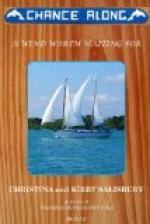If jackals were able to reason, doubtless they would justify their existence and prove their superiority to the common herd by some such fatuous argument.
Pierce’s complacency received its first jolt when he discovered that he had lost caste in the eyes of the better sort of people— people such as he had been accustomed to associate with at home. This discovery came as the result of a chance meeting with a stranger, and, but for it, he probably would have remained unaware of the truth, for his newly made friends had treated him with consideration and nothing had occurred to disturb his complacency. He had acquired a speaking acquaintance with many of the best citizens, including the Mounted Police and even the higher Dominion officials, all of whom came to the Rialto. These men professed a genuine liking for him, and, inasmuch as his time was pretty full and there was plenty of amusement close at hand, he had never stopped to think that the side of Dawson life which he saw was merely the under side—that a real social community was forming, with real homes on the back streets, where already women of the better sort were living. Oblivious of these facts, it never occurred to Pierce to wonder why these men did not ask him to their cabins or why he did not meet their families.
He had long since become a night-hawk, mainly through a growing fondness for gambling, and he had arrived at the point where daylight impressed him as an artificial and unsatisfactory method of illumination. Recently, too, he had been drinking more than was good for him, and he awoke finally to the unwelcome realization that he was badly in need of fresh air and outdoor exercise.
After numerous half-hearted attempts, he arose one day about noon; then, having eaten a tasteless breakfast and strengthened his languid determination by a stiff glass of “hootch,” he strolled out of town, taking he first random trail that offered itself. It was a wood trail, leading nowhere in particular, a fact which precisely suited his resentful mood. His blood moved sluggishly, he was short of breath, the cold was bitter. Before long he decided that walking was a profitless and stultifying occupation, a pastime for idiots and solitaire-players; nevertheless, he continued in the hope of deriving some benefit, however indirect or remote.




